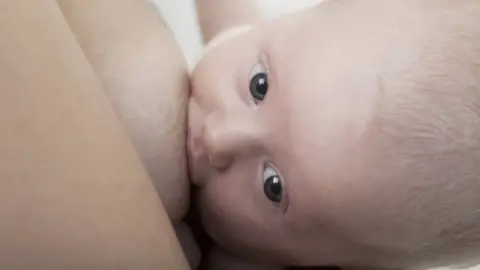Experts urge new breastfeeding 'conversation'
 Getty Images
Getty ImagesNew mothers need to be offered better support with breastfeeding, according to some of Scotland's leading experts in maternal and infant health.
A statement, signed by 30 of them, said women can feel pressured to breastfeed and often find it difficult.
They have called for a change in culture to provide all women with the right support, at the right time, in the right place.
The experts want to see improved training for health professionals.
They have also argued for better legal protection against the misleading promotion and marketing of formula milk.
Their call for a "change in the conversation" around breastfeeding comes at the start of National Breastfeeding in Scotland Week.
Mary Renfrew, professor of mother and infant health at Dundee University and one of the authors of the document, said: "National Breastfeeding Week is an important opportunity to reflect on whether we are all doing enough to enable women to breastfeed and what we could do better.
"There are significant and substantive differences between breastfeeding and not breastfeeding in regard to health and development outcomes, for both the baby and the mother.
"However, we know breastfeeding can be hard for women to do. A new way of enabling breastfeeding is needed - one that tackles the societal barriers that individual women cannot tackle alone and creates a shift in the prevailing culture and attitudes to breastfeeding."
 Thinkstock
ThinkstockShe added: "This should be put in place in a planned and co-ordinated way by decision-makers with funding, influence, authority and accountability, rather than relying on women's own determination, the motivation of health professionals, and the work of voluntary organisations alone.
"This will require a co-ordinated cross-sectoral strategy that engages everyone in the conversations needed to create a positive environment for women, babies and families in Scotland."
The statement recognises that breastfeeding is a complex issue, with the decision about whether or not to do it influenced by personal challenges and wider social factors.
Misleading advertising
These include access to support - from family, the community and in hospital, breastfeeding in public "still not being fully accepted, exposure to misleading advertising of formula and media messages often focusing on "negative aspects" of breastfeeding.
The statement said that as a result of these factors women often struggled and failed and may experience efforts to inform and help them as "pressure".
The experts urged a new approach which tackles "societal barriers" and "creates a shift" in the prevailing culture and attitudes.
This would include:
- providing all women with the right support, at the right time, in the right place
- providing legal protection against misleading marketing of formula
- ensuring all health professionals receive high-quality training
- providing education for children about breastfeeding
- ensuring all employers provide support for breastfeeding women in the workplace
- providing accessible information for all, to inform senior decision makers, health professionals, the media, and the public
The signed statement said everyone - women, families, the public, decision-makers, managers, teachers, charities, academics, employers, and the government - needed to be engaged in a "different conversation" about breastfeeding to "break down the barriers and create the circumstances in which babies can be breastfed, and women can enjoy breastfeeding".
Skin-to-skin contact
Public Health Minister Aileen Campbell said: "We support efforts to make it easier for women to breastfeed, by offering all women the help and support they need to enable them to do so.
"Scottish Breastfeeding Week is an important opportunity to increase our effort and to consider whether we are all doing enough to enable women to breastfeed and to consider what we could do more effectively."
She added: "Scotland has been working to improve the quality of support by implementing fully the Unicef UK Baby Friendly Initiative standards in maternity hospitals, for women at home and for families with babies in neonatal units.
"We are working to provide more consistent close skin-to-skin contact in neonatal units and support for expressing breast milk and breastfeeding.
"We need to remove the barriers that cause negativity towards breastfeeding, and to promote it as a natural and healthy activity for mothers and infants."
